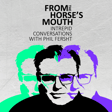
Paul Brody: Why Blockchain Still Matters in an AI-Obsessed World
The Agent Economy Is Coming—with Blockchain as Its Backbone.
“This is not about crypto hype. It’s about solving trillion-dollar problems.” — Paul Brody
What You’ll Hear in 30 Minutes
• Why blockchain is thriving quietly—through real enterprise use cases
• The new agent-to-agent economy and its AI + blockchain foundation
• How stablecoins could collapse cross-border fees and reinvent payroll
• Why security and privacy are prerequisites, not roadblocks
• The coming shift from demos to delivery in blockchain adoption
• Why simplification and use-case storytelling will define what scales
Guest Snapshots
Paul Brody is EY’s Global Blockchain Leader and Chair of the Ethereum Enterprise Alliance. From privacy-first payments to agent-integrated supply chains, Brody leads global efforts to evolve blockchain from pilot to production. Joining him is Saurabh Gupta, President at HFS, with over a decade covering blockchain's rise, plateau—and now rebirth.
Timestamps
00:00 – Where Is Blockchain Now?
02:16 – From Tech Obsession to Real-World Use Cases
04:18 – Is Blockchain Still Too Secretive?
06:55 – Can Blockchain Solve AI’s Security Problem?
08:53 – Agents, Predictive Maintenance & Blockchain Execution
10:34 – What Agent-to-Agent Economies Could Look Like
13:54 – Why Supply Chain Isn’t There Yet
15:22 – Blockchain Still Lacks an “Intuitive UX”
17:16 – The Stablecoin Surge & Bipartisan Regulation
20:48 – Streaming Payments and the End of Payday Loans
24:11 – Public vs. Private Blockchains: What Won
26:40 – What’s Next for Ethereum, Assets & Smart Contracts
Explore More
🌐 Learn more about EY Blockchain: https://www.ey.com/blockchain
🔗 Follow Paul: https://www.linkedin.com/in/pbrody/
🔗 Follow Saurabh: https://www.linkedin.com/in/hfssaurabh/
🔗 Follow Phil: https://www.linkedin.com/in/pfersht/








